Sources for Special Tools
Some of these tools will need to be purchased through a double reed supply store. There are many such stores online. The four I use most often are:
Miller Marketing Co. | Double Reed Instruments & Supplies
Double Reed Specialist: Oboe Reeds,Bassoon Reeds,Double Reed Supplies (forrestsmusic.com)
About Us (hodgeproductsinc.com)
Tools for Making Simple Adjustments
Bassoon Reed Reamer
The reamer is used to remove cane from the inside of the tube to get a better fit on the bocal.

- The reed needs to fit between 7-9mm onto the bocal. If the reed doesn’t go on that far, the reamer is used to remove material from the inside of the reed tube.
- The reed tube must be free of splinters to allow adequate air flow through the reed. The reamer is used to remove splinters inside the reed tube.
- Check the reed tube for splinters before you soak the reed each time it is played.
- The taper of the reamer tip will determine where cane is removed. The parabolic shape of the more expensive model by Rieger will take cane off more evenly from tube opening up to the second wire. The more sharply tapered shape of the 2XREED model requires more practice and care to avoid removing too much cane at the tube opening which would cause the reed to rock on the bocal.
- Clean the reamer after every use by using a clean dry toothbrush to remove any material on the cutting surfaces of the tip. (Dedicate a toothbrush solely to this purpose. Don’t use one that has been used on your teeth!)
- Once the reamer has dried, slide a section of plastic tubing over the metal tip to protect the cutting surfaces of the reamer.
REAM DRY. Best practice is to ream the tube when the reed is dry. The internal geometry of the tube is most stable when the cane is dry; reaming dry should prevent damaging the tube. However, a high-quality multi-fluted spiral reamer can be used when the reed it wet if necessary. Reaming dry will leave a cleaner, smoother surface whereas reaming wet may leave behind small splinters/fuzzies that will have to be removed with a round file.
Miller: Rieger Spiral Reamer – F8 @ $89.00 or 2XREED Bassoon Reed Reamer @ $30.00
Forrests: #E-31 Rieger Spiral Reamer @ $109.95 or #E-01 @ $49.95
Hodge Products: RR Rieger Spiral Reamer @ $99.95 or RSBR Reeds-n-Stuff Spiral Reamer = $69.95 (*best choice of the less expensive options due to the taper of the reamer tip)
Charles: BRE830 Rieger Spiral Reamer @ $109.95 (no acceptable lower cost option)
Diamond Fine-Grit Round Needle File
The round file is used to remove debris and small splinters of cane from the inside of reed tube to improve air flow through the reed.

- Always check the reed tube for splinters before you soak the reed.
- The round file is used to remove small splinters or fuzzy bits from the inside of the reed tube. Large splinter should be removed using a reamer.
- It is best used on a dry reed but can be used on a wet reed.
- Clean the file after every use by rinsing it in clean water. Let the file air dry before returning it to your tool kit.
Miller: 2XDFS 4-piece diamond file set @ $20.00 (The 3 additional files in the set can be used to adjust the taper and balance of the reed.)
Forrests: #E-27 Fine Grit Round Diamond File @ $9.95
Hodge: DNFR E-Z Lap Diamond Needle File – Fine Grit, Round @ $10.95
Charles: BFW130 Rat Tail File @ 17.95 (no round diamond file available)
Using the Diamond Fine-Grit Round Needle File (2:30-5:02)
Bassoon Short Mandrel
Insert the short mandrel into the reed tube prior to adjusting the wires or the tube.

- The mandrel is inserted into the tube of the reed to prevent the tube from collapsing or getting crushed during the adjustment process.
- The mandrel also helps hold the reed during adjustment.
- Inexpensive “holding mandrels” fit too far into the reed tube, often allowing the mandrel tip to extend into the interior of the blade. This makes it impossible to use a plaque when scraping/adjusting the blades of the reed.
- ALWAYS insert a mandrel when working on the tube of the reed.
Miller: Miller Pro Bassoon Mandrel @ $29.00
Forrests: #E-30 Rieger Bassoon Mandrel @ $40.95
Hodge: Reeds-N-Stuff Holding Mandrel @ $29.95
Charles: Fox Short Forming Mandrel @ $20.95
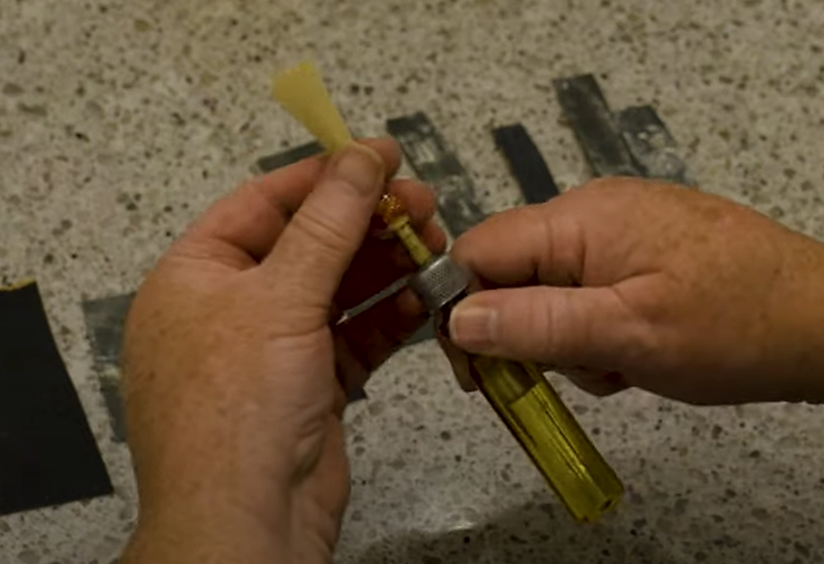
Bassoon Plaque
- The plaque fits between the blades of the reed and fills the space between the blades to prevent them from cracking when scraping, filing, or sanding the blades.
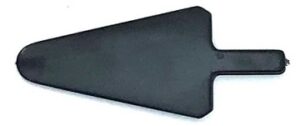
- ALWAYS insert a plaque when working on the blades.
- Soak the reed before inserting the plaque.
- Carefully insert the plaque between the blades starting with the tip of the arrowhead.
- They are small and can get lost easily so get two or three if you can.
- Remove any debris on the plaque using a clean toothbrush and water. Dry the plaque prior to storage.
Note: I prefer a plastic plaque because I find it doesn’t slide out of the reed when scraping the blades with a knife, and my knife doesn’t dull as quickly as with a metal plaque.
Miller: 2XREED Bassoon Plaque – Plastic @ $5
Forrests: #G-14 Contoured Plastic Bassoon Arrow Plaque @ $6.99
Hodge: PPBPA-36.2 Pisoni Plastic Bassoon Arrow Plaque @ $3.95
Charles: Black Plastic Arrowhead Bassoon Plaque @ $4.95
Using the Plaque (00:00-00:53)
Brass Wire (22 Gauge)
22 Gauge brass wire is used to hold the two halves of the reed tube together.
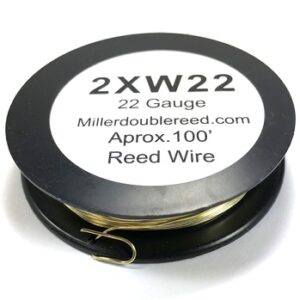
- The traditional bassoon reed has three wires holding the tube together.
- The first wire is the one closest to the blades of the reed.
- The second wire is the one in the middle.
- The third wire, also called the bocal wire, is near the bottom of the tube. It is usually covered with some sort of binding (string, heat shrink tubing, or hot glue) and cannot be adjusted without removing the binding material.
- Each wire has a specific point of placement on the tube that affects intonation, response, tone, and mouth feel of the reed.
- Soft brass wire will conform to the shape of the reed tube and can usually withstand manipulation during the reed making process. However, the wires can break and will need to be replaced.
- 22 gauge is the thickness used by most bassoonists because it provides adequate support for the tube without restricting the vibrations of the reed.
- Reed wires might be a little lose on a dry reed but need to be snug on a soaked reed. However, wires that are too tight will limit the reed’s ability to vibrate.
Miller: 2XREED Soft Brass Wire – Spool of c. 100′ @ $10.00
Forrests: #G-05 Bassoon Reed Wire, 22 Gauge – Spool of 35′ @ $7.95
Hodge: Bassoon Wire – 22 Gauge, 45ft @ $13.95
Charles: 22 Gauge Brass Wire, 4 oz. @ $14.95
Note: While hardware stores and craft supply stores sell wire, it is generally the wrong metal, wrong gauge, or the wrong shape. It is best to buy this wire from a double reed supply shop.
Linesman Pliers
Linesman pliers are used to adjust the tightness and shape of the wires and tube, as well as the size of the tip opening.
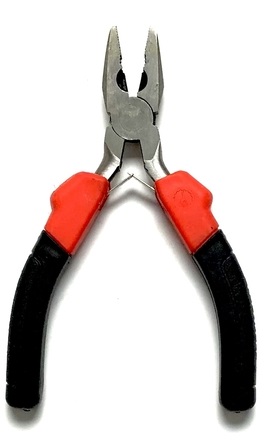
- Stubby needle-nose pliers from the hardware store can be a less expensive substitute.
Miller: 2XREED Linesman Pliers @ $10.00
Forrests: #E-38 Bassoon Reed Pliers @ $31.95
Hodge: RSBP Reeds ‘n Stuff Bassoon Pliers @ $41.95
Charles: not available
Lowe’s: Kobalt 7″ linesman pliers with wire cutter @ $15.98
Home Depot: Crescent 8′ linesman cutting pliers @ $15.71
Ace: Performance Tool 7′ Alloy Steel Linesman Pliers @ $8.59
Wet/Dry Sandpaper (220 and 400 grit)
Wet/Dry sandpaper is used to smooth the surface of the blades.
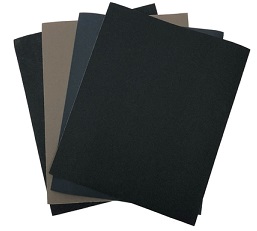
- Wet the reed before using sandpaper. The water will combine with the particles of cane and sandpaper to form a fine abrasive paste.
- Rinse the reed well after using sandpaper to remove the grit and paste.
- Sand the blades using 400 or 600 grit after every adjustment you make with a knife or file.
- Wet/Dry sandpaper comes in many grits. The larger numbers have a finer grit.
- Use course grit sandpaper (220 or 320 grit) to remove cane from the blade.
- Use finer grit sandpaper (400 or 600 grit) to give the blades and smooth finish.
- Sanding the inside of the blades at the tip can tame a bright reed.
- Use scissors to cut 2′ to 3′ strips from the sheets of sandpaper. The smaller strips are easier to aim and manipulate.
Miller: 2X999 – 2XREED Sandpaper Combo with 1 each of 220. 320, 400, and 600 grit @ $5
Forrests: #E-17 Norton Sandpaper in 220, 320, 400, 600 grits @ $2.25/sheet = $9 *Each grit must be added separately.
Hodge: NSP320, NSP400, NSP600 (220 not available) @ $6.95 per grit = $20.85 *Each grit must be added separately.
Charles: GGA070 Waterproof sandpaper in unspecified grit @ 0.50 cents/sheet
Ruler (6 inch metric)
The ruler is used to measure various dimensions of the reed.

- The ruler is needed to measure parts of the reed:
- Total length (from bottom of tube to the tip)
- Width of blade at the tip
- Length of blades
- Length of tube
- Distance between the first and second wires
- Measurements in this book use the metric system and are given in millimeters
Miller: 2XRU – 6′ metal ruler @ $4
Forrests: #R-05 6′ stainless steel ruler @ $4.95
Hodges: RU Hodge Steel Ruler @ $3.95
Charles: ORM080 Steel Ruler @ $3.95
End Nippers or Tip Cutter
End nippers or a tip cutter are used to shorten the reed blades.
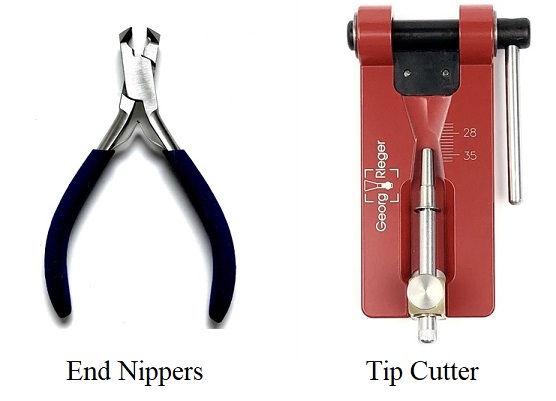
- End nippers or a tip cutter shorten the blades by clipping off a small amount (0.5 to 1.0 mm at a time).
- Go slowly! You can always take more off, but you can never put any back on!
- Shortening the blades will increase resistance and raise the pitch of the reed.
- Clipping the tip is a common fix for a sagging third-space E natural.
- End Nippers are less expensive, but they require a steady hand, a good eye, and a bit of practice to make a straight cut across the entire width of both blades.
- Tip Cutters are more expensive but are much easier to use.
- Remove any debris from the blade with a clean, dry toothbrush after each use.
- Dry the tool before it is returned to your toolkit.
Miller: BNPEN Precision End Nippers @ $69.95 or RBTC Rieger Bassoon/Contrabassoon Tip Cutter @ $199.00
Forrests: #B-29 Forrests Reed Tip Cutter @ $54.95 or #B-31 Rieger Bassoon Reed Tip Cutter @ $285.00
Hodge: RCP Rigotti Tip Cutting Nippers @ $76.95 or RBRTC Rieger Bassoon Reed Tip Cutter @ $269.95
Charles: BPT210 Bassoon End Nippers by Swiss Grobet @ $49.95 or BPT810 Rieger Bassoon Tip Cutter @ $329.00

Feedback/Errata